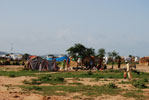
Enough has been closely monitoring the impact of the International Criminal Court arrest warrant for Sudanese President Omar al-Bashir on the dynamics in volatile eastern Chad, but we have been quiet about the 5,000-plus Chadian rebels who have been camped out for the past several months in Darfur (courtesy of the Sudanese government’s kind hospitality). It is not always easy to predict the next move of Chad’s key rebel leaders, whose shifting alliances and changing directions mimic the Sahelian desert winds. However, now that the wind is once again blowing in a relatively discernable direction—from Darfur toward the Chadian capital N’Djamena—we figured it was time for a post.
We’ll start with two simple questions that are useful to consider when analyzing almost every rebel or insurgency movement: who are the Chadian rebels and what do they want?
The key Chadian rebel actors today have all at one time or another served in Chadian President Idriss Déby’s regime. Déby’s government is less a ruling body and more a backstabbing cabal of mostly desert military men-cum-politicians whose familial and ethnic ties (in that order) bind them together and tear them apart. All of the rebel commanders—from Mahamat Nouri to Timane Erdimi to Mohammed Nour—want regime change in N’Djamena but, of course, they have different ideas about who should end up at the top of the heap and thus in control of Chad. Erstwhile foes, Nouri and Erdimi banded together in December and announced their intent to launch an assault on the capital. A month ago, we predicted that they were “receiving their final marching orders” from Khartoum before heading West. However, a month later, this rebel coalition has not made their move across the border.
What is the hold up? Aside from the fact that the rebels are not fully united, the answer may lie partly in the ongoing proxy war between Chad and Sudan. The extent to which the Chadian and Sudanese governments control the actions of these rebel groups and factions varies, but the rebels camped out on either side of the border rely heavily on patronage from the Sudanese and Chadian governments. Although the Chadian rebels may seek to disassociate themselves from the Sudanese regime now that President Bashir is sought for war crimes and crimes against humanity, the rebels pose little threat to President Déby without weapons, vehicles, and training from Khartoum. It is also unlikely that the Chadian rebels will make their move until they get a green light from Khartoum, and the Sudanese government may be wary of giving the signal as it waits for an international response to the expulsion of humanitarian organizations. In addition, President Deby’s recent military spending spree—including several new helicopter gunships—is added deterrent to a hastily and poorly planned attack. The sight of these gunships may be enough to give even the most hardened desert fighters cold feet, given that their best weapons are “technicals” (see our “Darfur Rebels 101” strategy paper for a brief rundown on desert combat).
Yet no matter how you look at it, the human toll of this proxy war will almost certainly escalate drastically in coming weeks, and this situation will only worsen if (or when) the Chadian rebels make a run on N’Djamena. The consequences of this proxy war on civilian populations in both nations are already staggering on both sides of the border. In eastern Chad there are over 250,000 Darfuri refugees and nearly 200,000 internally displaced Chadians. In Darfur, there are nearly 50,000 Chadian refugees and, as a result of Khartoum’s recent decision, the specter of famine and disease looms for 2.7 million internally displaced Darfuris. As conditions worsen, many may be forced to flee into the abyss of arms-ridden eastern Chad. Enough’s Colin Thomas-Jensen recently suggested that Khartoum is aiming to drive the displaced Darfuri population into eastern Chad in part to create another headache for President Déby, as refugees would be forced into competition with local Chadians for resources inside and outside of camps in eastern Chad. Khartoum may be waiting to launch a rebel run at N’Djamena until President Déby is reeling from an influx of new refugees from Darfur.
However, it may be now or never—at least for this dry (read “rebellion”) season—for Chad’s annual coup attempt. They have until May to make their way across over 500 miles of Sahelian desert from Darfur to N’Djamena before the rains come. We’ll keep you posted on events on the Chad-Sudan border as they develop; keep checking back for the latest.

